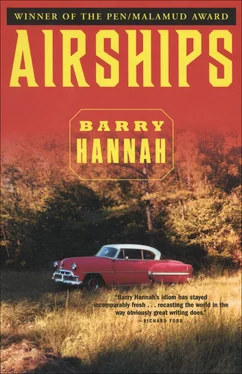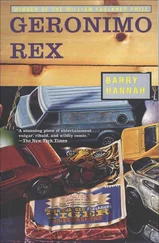“Do you really think we’ll be famous?” Tubby got an enchanted look on him, sort of a dumb angel look in that small pretty face amid the fat rolls. It was about midnight. There was a fine Southern moon lighting up the field. You could see every piece of straw out there. Tubby, by my ass, had the high daze on him. He’d stepped out here in the boonies and put down his foot in Ozville.
“This’ll get me Major, anyhow. Sure. Fame. Both of us,” I said.
Tubby said: “I tried to get nice touches in with the light coming over his face. These pictures could turn out awfully interesting. I was thinking about the cover of Time or Newsweek .”
“It’ll change your whole life, Tubby,” I said.
Tubby was just about to die for love of fate. He was shivering.
I started enjoying the field again. This time the straws were waving. It was covered with rushing little triangles, these sort of toiling dots. Our side opened up. All the boys came up to join within a minute and it was a sheet of lightning rolling back and forth along the outside of the woods. I could see it all while I was walking back to the radio. I mean humping low. Tubby must’ve been walking straight up. He took something big right in the square of his back. It rolled him up twenty feet in front of me. He was dead and smoking when I made it to him.
“C’mon, I’ve got to get the pictures,” he said.
I think he was already dead.
I got my phosphorus shotgun. Couldn’t think of anything but the radio and getting it over how we were being hit, so we could get dragons — helicopters with fifty cals — in quick. The dragons are nice. They’ve got searchlights, and you put two of them over a field like we were looking at, they’d clean it out in half an hour. So I made it to the radio and the boys had already called the dragons in, everything was fine. Only we had to hold them for an hour and a half until the dragons got there. I humped up front. Every now and then you’d see somebody use one of the experimental guns. The bad thing was that it lit up the gunner too much at night, too much shine out of the muzzle. I took note of that to tell them when we got back. But the gun really smacked the gook assault. It was good for about seventy-five yards and hit with a huge circle burn about the way they said it would. The gooks’ first force was knocked off. You could see men who were still burning running back through the straw, hear them screaming.
I don’t remember too well. I was just loitering near the radio, a few fires out in the field, everything mainly quiet. Copters on the way. I decided to go take a look at Li Dap. I thought it was our boys around him, though I didn’t know why. They were wearing green and standing up plain as day. There was Oliver, smoking a joint. His rifle was on the ground. The NVA were all around him and he hadn’t even noticed. There were so many of them — twenty or so — they were clanking rifles against each other. One of them was going up behind Oliver with a bayonet, just about on him. If I’d had a carbine like usual, I could’ve taken the bayoneteer off and at least five of the others. Oliver and Li Dap might’ve ducked and survived.
But I couldn’t pick and choose. I hardly even thought. The barrel of the shotgun was up and I pulled on the trigger, aiming at the bayoneteer.
I burned them all up.
Nobody even made a squeak.
There was a flare and they were gone.
Some of my boys rushed over with guns. All they were good for was stomping out the little fires on the edges.
When we got back, I handed over Tubby’s pictures. The old man was beside himself over my killing a general, a captured general. He couldn’t understand what kind of laxity I’d allowed to let twenty gooks come up on us like that. They thought I might have a court-martial, and I was under arrest for a week. The story got out to UPI and they were saying things like “atrocity,” with my name spelled all over the column.
But it was dropped and I was pulled out and went home a lieutenant.
That’s all right. I’ve got four hundred and two boys out there — the ones that got back — who love me and know the truth, who love me because they know the truth.
It’s Tubby’s lost fame I dream about.
The Army confiscated the roll and all his pictures. I wrote the Pentagon a letter asking for a print and waited two years here in Vicksburg without even a statement they received the note. I see his wife, who’s remarried and is fat herself now, at the discount drugstore every now and then. She has the look of a kind of hopeless cheer. I got a print from the Pentagon when the war was over and it didn’t matter. Li Dap looked wonderful — strained, abused and wild, his hair flying over his eyes while he’s making a statement full of conviction.
It made me start thinking of faces again.
Since I’ve been home I’ve crawled in bed with almost anything that would have me. I’ve slept with high-school teachers, Negroes and, the other night, my own aunt. It made her smile. All those years of keeping her body in trim came to something, the big naughty surprise that the other women look for in religion, God showing up and killing their neighbors, sparing them. But she knows a lot about things and I think I’ll be in love with her.
We were at the John Whitelaw vs. Whitney Maxwell play-off together. It was a piece of wonder. I felt thankful to the wind or God or whoever who brought that fine contest near enough by. When they hit the ball, the sound traveled like a rifle snap out over the bluffs. When it was impossible to hit the ball, that is exactly when they hit it.
My aunt grabbed hold of my fingers when the tension was almost up to a roar. The last two holes. Ah, John lost. I looked over the despondency of the home crowd.
Fools! Fools!. I thought. Love it! Love the loss as well as the gain. Go home and dig it. Nobody was killed. We saw victory and defeat, and they were both wonderful.
I threw a party, wore a very sharp suit. My wife had out all sorts of hors d’oeuvres, some ordered from long off — little briny peppery seafoods you wouldn’t have thought of as something to eat. We waited for the guests. Some of the food went bad. Hardly anybody came. It was the night of the lunar eclipse, I think. Underwood, the pianist, showed up and maybe twelve other people. Three I never invited were there. We’d planned on sixty-five.
I guess this was the signal we weren’t liked anymore in town.
Well, this had happened before.
Several we invited were lushes who normally wouldn’t pass up cocktails at the home of Hitler. Also, there were two nymphomaniacs you could trust to come over in their highfashion halters so as to disappear around one in the morning with some new innocent lecher. We furthermore invited a few good dull souls who got on an occasional list because they were good and furnished a balance to the doubtful others. There was a passionate drudge in landscaping horticulture, for example.
But none of them came.
It was a hot evening and my air-conditioner broke down an hour before the party started.
An overall wretched event was in the stars.
Underwood came only for the piano. I own a huge in-tune Yamaha he cannot separate himself from. Late in the evening I like to join him on my electric bass.
Underwood never held much for electric instruments. He’s forty-two, a traveler from the old beatnik and Charlie Parker tribe. I believe he thinks electric instruments are cowardly and unmanly. He does not like the basic idea of men joining talents with a wall socket. In the old days it was just hands, head and lungs, he says. The boys in the fifties were better all-around men, and the women were proud of being after-set quim.
Читать дальше












